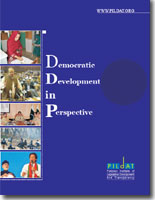The General Election of May 2013 marked a significant development for Pakistan’s democracy. The first successful transition from one democratically elected civilian Government under a civilian democratically elected President, to another took place. Although it was a cause for much optimism amongst the proponents of democracy, it was also received with tempered caution considering Pakistan’s frequent, historic subjection to military coups. PILDAT, which has been assessing the quality of democracy in Pakistan since 2011, wanted to include a paper, as part of its democracy assessment exercise, which gave a comparative assessment of the quality of democracy especially from the perspective of stages of democratic transition and where exactly Pakistan falls in its journey towards becoming a mature democracy. This was of interest not only because of Pakistan’s status as a democracy in transition due to its authoritarian past but also because trajectories adopted by different countries in the path to democratization have not been the same. A comparative assessment was therefore bound to result in conclusions useful not only to chart Pakistan’s democratic progress but also of other countries around world. In this PILDAT paper, authored by Dr. Andrew Blick, Lecturer in Politics and Contemporary History at King’s College London, with years of experience in assessing the quality of democracy across nations, the author dilates not only upon the historic waves of democratization across the world, but also discusses the various factors that might facilitate or impede a country’s democratic journey. These include the socio-economic environment, the country’s experience with imperialism, the role of religion, the role of the military, etc.







